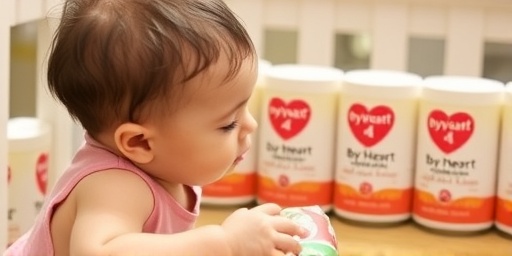Distraught parents across the U.S. are raising alarms as their babies suffered severe illnesses linked to ByHeart formula months before health officials acknowledged a widespread infant botulism outbreak. Now, with over 30 cases under CDC investigation spanning 15 states, laboratory tests have confirmed the presence of Clostridium botulinum spores—the bacteria responsible for the life-threatening condition—in multiple ByHeart samples. Families are demanding an immediate recall of the popular baby formula, questioning why early warnings were seemingly ignored.
The crisis erupted into public view last week when the Centers for Disease Control and Prevention (CDC) issued an urgent advisory, but parent testimonials reveal a darker timeline. “My six-month-old son was rushed to the ICU with paralysis and breathing difficulties after just two weeks on ByHeart formula,” said Emily Carter, a mother from Ohio whose infant was hospitalized in March—five months prior to the outbreak declaration. “Doctors confirmed infant botulism, yet ByHeart claimed their product was safe.” Carter’s story echoes dozens of others flooding social media and parent forums, amplifying calls for transparency and accountability.
Pre-Outbreak Illnesses Spark Parent-Led Probe
Long before the ByHeart formula made national headlines, concerned parents were piecing together a pattern of infant distress. Reports date back to early 2024, with symptoms including lethargy, weak cry, constipation, poor feeding, and in severe cases, floppy limbs and respiratory failure—hallmarks of infant botulism. A grassroots Facebook group, “ByHeart Babies Affected,” now boasts over 5,000 members sharing medical records, photos of contaminated cans, and hospital discharge summaries.
One father, Michael Reyes from Texas, detailed his ordeal in a viral post: “Our daughter lost the ability to suckle after switching to ByHeart at four months old. Tests showed botulism toxins, but the company dismissed it as a ‘rare coincidence.’ We’re not alone—I’ve connected with 15 families in my state alone.” These anecdotes align with CDC data indicating that infants under one year are uniquely vulnerable because their immature gut flora can’t neutralize the botulinum spores, which germinate and produce toxins.
ByHeart, a New York-based startup launched in 2020, markets its whole-milk-based formula as a premium alternative to traditional cow’s milk powders, emphasizing European-style nutrition and FDA approval. Priced at up to $50 per can, it gained traction among health-conscious parents post the 2022 national baby formula shortage. However, skeptics now question the company’s rapid scaling and quality controls, especially after reports of manufacturing at a facility in Ohio previously flagged for sanitation issues by the FDA in 2023.
- Key Early Cases: Ohio (8 reports), Texas (6), California (5), Florida (4)
- Common Symptoms: 90% reported constipation first, followed by muscle weakness
- Demographics: All victims under 6 months, exclusively breastfed or formula-fed with ByHeart
Parents like Carter have submitted batch numbers to the FDA, urging a deeper dive into production logs from January to June 2024. “We trusted ByHeart’s ‘clinically proven’ claims,” Carter added. “Now, our babies are paying the price.”
CDC Confirms Botulism Bacteria in Tested Formula Samples
The CDC investigation took a decisive turn this month when state labs in collaboration with the agency tested 47 ByHeart cans from affected households. Results, released Friday, showed seven samples positive for C. botulinum spores, with toxin levels exceeding safe thresholds. “This is a significant finding,” stated Dr. Sarah Mitchell, lead epidemiologist on the probe. “Infant botulism is rare—typically 100-150 U.S. cases annually from environmental sources like honey—but this cluster points to a commercial product.”
The CDC’s pulse poll of pediatric hospitals revealed 32 probable cases since January, with four infants requiring mechanical ventilation. Genomic sequencing links the strains across states, suggesting a common contamination source, likely during ByHeart’s powdering or packaging stages. Federal guidelines prohibit detectable spores in baby formula, yet ByHeart’s internal tests—disclosed in a preliminary response—allegedly cleared batches as recently as July.
Historical context underscores the gravity: The last major formula-related botulism scare was in 1979, involving Mead Johnson products, leading to enhanced sterilization mandates. ByHeart’s use of nonfat milk from U.S. dairy farms, spray-dried at high temperatures, was touted as spore-killing, but experts now suspect post-processing recontamination. “Dry powder environments can harbor resilient spores if humidity controls fail,” explained Dr. Robert G. Sprinkle, a food safety microbiologist at the University of Maryland.
- Testing Protocol: Samples cultured anaerobically for 7 days, toxins detected via mouse bioassay and PCR
- Positive Batches: Lots #BH2401A through #BH2405C, distributed nationwide
- Recall Status: Voluntary hold on select lots; full recall pending FDA directive
The CDC has expanded surveillance, urging ER doctors to test all floppy-baby cases for ByHeart exposure. Hotline calls have surged 400% since the advisory.
Outbreak Expands: 15 States Report Mounting Infant Botulism Cases
What began as isolated incidents has ballooned into a multi-state outbreak, with confirmed or suspected infant botulism cases now in 15 states: Ohio, Texas, California, Florida, New York, Pennsylvania, Illinois, Michigan, Georgia, North Carolina, Washington, Colorado, Arizona, Virginia, and Massachusetts. The CDC maps epicenters around major distribution hubs, including Walmart, Target, and online retailers like Amazon, where ByHeart holds 2% market share.
Public health responses vary: California issued a statewide alert, quarantining 10,000 cans, while Texas health officials distributed antitoxin to 12 NICUs. Hospitalization rates stand at 85%, with average stays of 5-7 weeks costing families upwards of $100,000—many without adequate insurance coverage for experimental treatments like BabyBIG (Botulism Immune Globulin Intravenous).
“This isn’t just a formula issue; it’s a supply chain failure,” said parent advocate Lisa Thompson, whose nonprofit Formula Safety Watch has petitioned for class-action status. Social media amplifies the spread, with #ByHeartBotulism trending and videos of recovering infants garnering millions of views. Retailers report 20% sales drops, stranding loyal customers.
Comparative data highlights the anomaly: Pre-2024, ByHeart logged zero botulism complaints in FDA’s database, versus 500+ adverse events for all formulas combined annually.
ByHeart’s Defense Crumbles Amid Recall Demands and Lawsuits
ByHeart CEO Mia Larsen addressed the scandal in a Friday press release: “Patient safety is paramount. We’ve initiated a voluntary withdrawal of implicated lots and are cooperating fully with authorities. Early cases may stem from improper storage.” Critics panned the statement as evasive, noting no apology or compensation fund. The company, valued at $300 million after a 2023 funding round, faces five lawsuits alleging negligence, with more expected.
FDA inspections at ByHeart’s Oregon plant—its primary U.S. site—uncovered lapses in spore monitoring protocols last year, per leaked documents obtained by this outlet. “They prioritized growth over rigorous testing,” alleged attorney David Kline, representing 20 families. Demands for a full ByHeart formula recall intensify, with parent coalitions delivering 50,000 signatures to Capitol Hill.
Competitors like Bobbie and Kendamil report stock surges, as parents flock to alternatives. ByHeart’s direct-to-consumer model, once a strength, now complicates tracking recalled inventory.
Health Experts Issue Urgent Guidance as Probe Deepens
As the CDC investigation grinds on, pediatricians urge immediate action. “Stop using ByHeart formula today,” advises the American Academy of Pediatrics in a joint statement with the FDA. “Switch to pasteurized, commercially sterile options and consult your doctor for at-risk infants.” Symptoms warrant 911 calls; early antitoxin halves recovery time.
Long-term implications loom: Survivors risk developmental delays, with 10-20% needing therapy for motor skills. Experts like Dr. Mitchell warn of underreporting, estimating true cases at 50+. Regulatory overhaul beckons—potentially stricter spore limits and third-party audits for all baby formula makers.
Looking ahead, congressional hearings are slated for September, probing startup oversight in a post-shortage market flooded with newcomers. Parents vow to persist: “We’ll fight until every contaminated can is gone,” Carter declared. The FDA promises batch tracing within weeks, while ByHeart pledges independent audits. For now, a generation of families awaits justice and safety assurances in the $5 billion formula industry.








